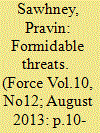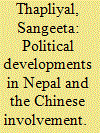| Srl | Item |
| 1 |
ID:
118533


|
|
|
|
|
| Publication |
2012.
|
| Summary/Abstract |
This article reviews the Sino-Israel relationship from the Chinese perspective. It argues that the relationship is at a crossroad because China is increasingly more proactively involved in the international arena, which will inevitably lead to China's more assertive role in trying to facilitate solving the Israel-Palestinian conflicts. China has been inclined to be more supportive to the Palestinian side based on Chinese cultural values, traditionally stronger ties with Arab countries, and also since Palestine is generally considered as the weaker side of the conflict. A strong Israel-U.S. relationship will help balance Israel's relationship with China. The Sino-Israel relationship cannot be viewed out of the context of a Sino-U.S. relationship. China is more concerned with its relationship with the U.S., the only other world economy comparable in size to China's, in order to protect the peaceful world order for further development. Future Chinese involvement with the Palestinian region will be more constructive.
|
|
|
|
|
|
|
|
|
|
|
|
|
|
|
|
| 2 |
ID:
126122


|
|
|
|
|
| Publication |
2013.
|
| Summary/Abstract |
China does not need to go to war with India. Pakistan, at present, is satisfied with its strategy of proxy war against India. However, a limited two-front war into the future started by Pakistan in Northern Kashmir (Siachen) is not ruled out; Chinese involvement in it will be indirect with its asymmetrical capabilities. India's political and military leadership, unfortunately, has shown little appreciation of what it may be up against.
China accomplished the incredible by its three-week intrusion in April 2013 in Northern Ladakh against India. With mere 30 border guards, it did successful military coercion resulting in a total capitulation of India's political leadership. This showed a lack of understanding in Delhi of Chinese diplomacy where counter-coercion does not necessarily translate into war. Moreover, China which is pitted against the US for supremacy in Asia would stay away from a border war with India. However, its coercive diplomacy, especially one achieved with minimal show of strength, has provided numerous strategic gains to Beijing.
|
|
|
|
|
|
|
|
|
|
|
|
|
|
|
|
| 3 |
ID:
179362


|
|
|
|
|
| Summary/Abstract |
The dissolution of parliament in Nepal has brought the focus back on its fragile democracy. After years of political instability, a new constitution and one party with absolute majority in the general elections gave the impression and hope that the future looked promising for political stability. But that did not take place. Nepalese politics have remained volatile. The article makes an assessment and suggests the path for India keeping in view Chinese machinations.
|
|
|
|
|
|
|
|
|
|
|
|
|
|
|
|